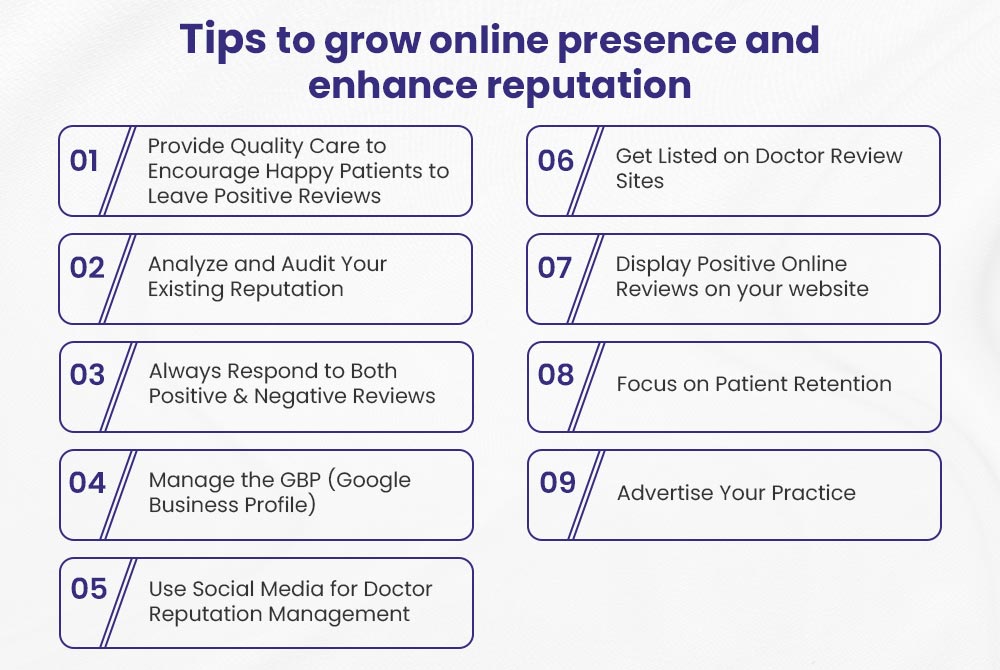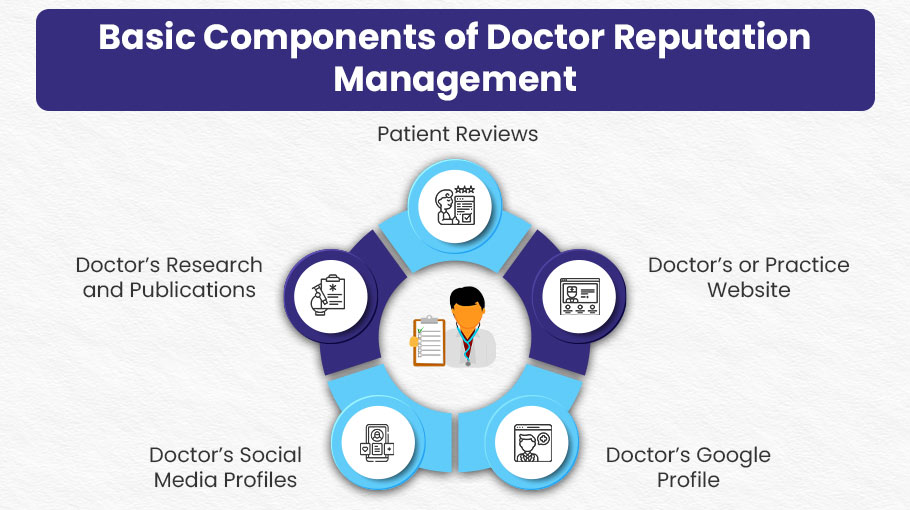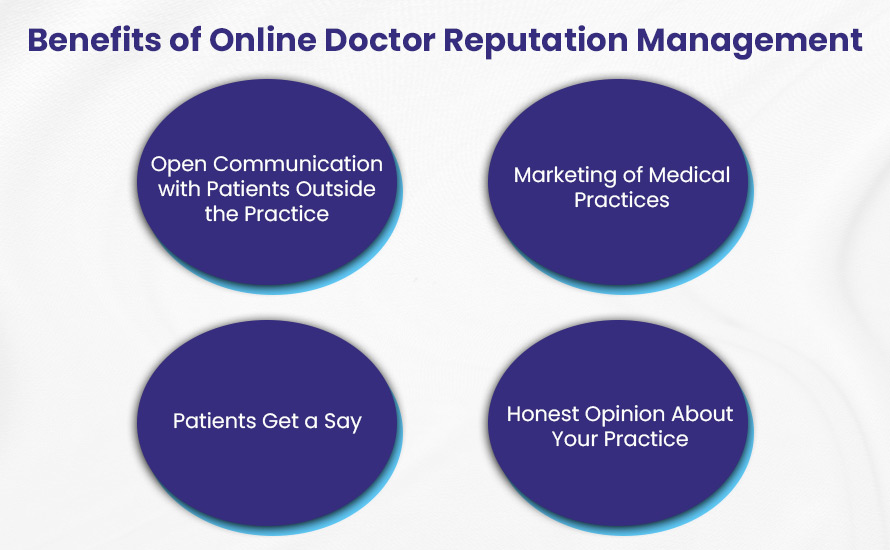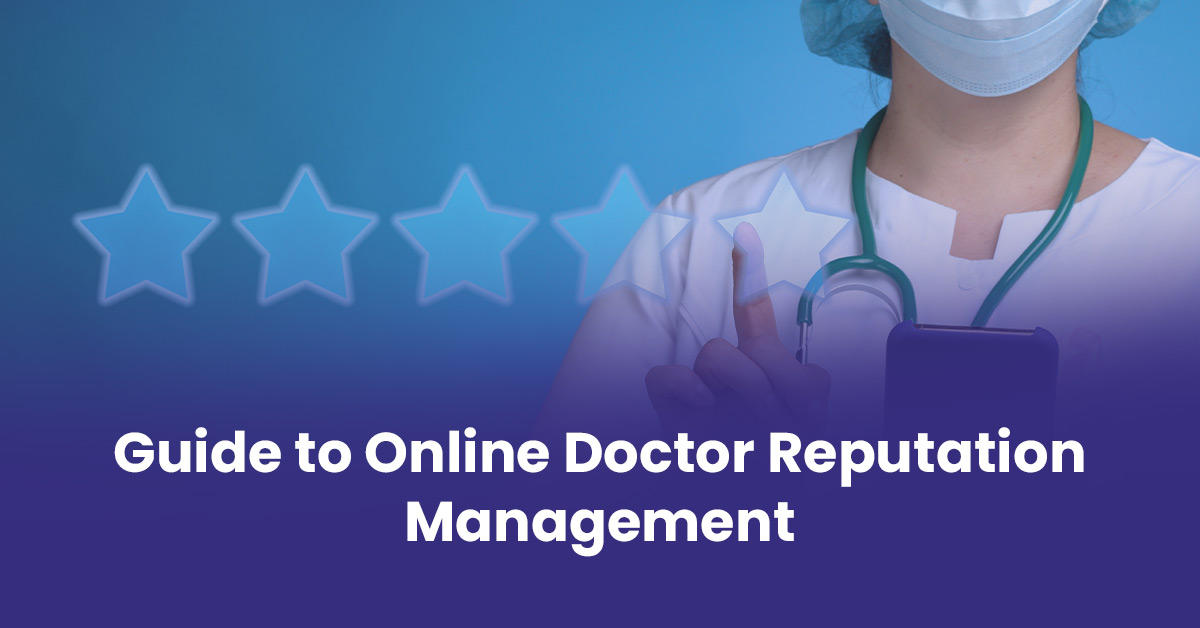Approximately 90% of users choose Google when they need to know, buy, or find something. Similarly, more than 75% of patients use online resources to find doctors and healthcare practices when they need medical services. They typically book appointments with those who have high ratings and the most positive reviews.
So, if you are on that list, you can attract more patients and bring more visitors to your practice. However, you must manage your reputation as one of the top healthcare providers.
As a doctor, having a positive online reputation can greatly influence your ability to attract new patients and retain existing ones by offering quality care. On the other hand, a negative reputation can harm your practice and cause you to lose patients, leading to reduced income. Therefore, maintaining a strong online reputation is essential for you and your practice.
Here, we will discuss what a doctor’s reputation is and how it can help grow your practice. We will also guide you on managing your reputation with proven tips for doctor reputation management.
What is Online Doctor Reputation Management?
Doctor reputation management is the process of monitoring, managing, and improving the online presence and goodwill of a doctor or healthcare practice. The method may include:
- Responding to patients’ reviews.
- Managing doctors’ online profiles.
- Uploading content on the website and social media pages to spread awareness about the doctor or practice.

Here are some tips that help manage a doctor’s reputation.
⬇️⬇️⬇️
Tips to Grow Online Presence and Enhance Doctor Reputation

Online doctor reputation management is vital in improving your practice and the care services you provide as a medical provider. By building a strong reputation, you can attract more patients to your practice as a trusted doctor in your area. This can lead to increased patient volume, higher revenue, and expanded care services.
However, to manage and enhance your online reputation, you need to follow the following tips:
1). Analyze and Audit Your Existing Reputation
Before considering any strategy for doctor reputation management, it’s essential to evaluate your practice’s current reputation and understand where your business stands today. This will help you make informed decisions moving forward.
You should check:
- What are the positive aspects?
- What are the negative aspects?
Evaluating the current status of your practice will give you a clear picture of where to begin and how to address any shortcomings.
You can quickly analyze the reputation of your practice and services using the following tools:
- Search engines (Google, Bing)
- Social media sites (Facebook, LinkedIn, Twitter)
- Doctor review sites (Yelp, Google, Healthgrades, RateMDs)
After thoroughly reviewing your online presence, ask yourself:
- Where do you appear on search engine results pages (SERPs)?
- How much traffic are you driving to your social media pages?
- Is there any negative content that needs to be addressed?
Once you’ve gathered this information, you can choose an effective strategy to manage your reputation. However, opting for third-party reputation management services can also deliver productive results.
2). Provide Quality Care to Encourage Happy Patients to Leave Positive Reviews
Reviews are everything!
Receiving more positive reviews from patients can boost a doctor’s online reputation and build trust with new patients. You can easily encourage patients to leave positive reviews after providing them with quality healthcare services.
When patients visit your practice and have a great experience, they are likely to leave you a positive review. Therefore, to gather reviews and maintain a strong reputation, it’s essential to provide high-quality care.
3). Always Respond to Both Positive and Negative Reviews
While it’s important to celebrate positive reviews and respond accordingly, you should also address negative reviews. Sometimes, due to misunderstandings after receiving care, a patient may leave a negative review. In such cases, it’s important to respond politely to regain their trust and protect your reputation. Both positive and negative reviews are vital for doctor reputation management.
👉 Responding to every review, whether positive or negative, shows that you care about your patients and value their feedback.
For example, if you receive a negative review, respond promptly and apologize for their unpleasant experience at your practice. Invite them to revisit, address their concerns, and offer solutions. About 80% of patients are willing to return if their negative review is handled well.
👉 If you receive a positive review, thank the patient and appreciate their kind words. You can also invite them to visit again if needed.
Here are some examples of responses to negative and positive reviews that can play a key role in doctor reputation management:
❌ Negative Review Response
“Hi ABC, we are sorry you had an unpleasant experience at our medical practice. We would love the opportunity to make it right. Please contact us directly so we can address the issues you encountered. Thank you.”
✔️ Positive Review Response
“Hi XYZ, thank you so much. We appreciate you taking the time to write such kind words about our practice! We’re glad you had a great experience at our clinic.”
4). Manage the GBP (Google Business Profile)
You can strengthen and improve your online presence by optimizing your GBP (Google Business Profile) or GMB (Google My Business Profile). It is a powerful tool for boosting your visibility and doctor reputation management. When your business profile is listed, patients can easily find you and your practice on Google Maps and in search results, increasing foot traffic to your practice. You can also showcase patient reviews left after receiving care.
To maintain your reputation, ensure your GBP listing has accurate and complete information. Here are some tips for optimizing your GBP:
- Choose the right category for your practice (e.g., Dentist, Orthodontist).
- Add your business name, address, and phone number (NAP).
- Use the same NAP details on your website and other online listings to maintain consistency.
- Add high-quality photos of your office, staff, and equipment.
- Encourage patients to leave reviews on your GMB listing.
An optimized GBP can play a key role in managing your reputation. When patients search for doctors nearby, your profile will appear in search results if you’ve managed it well.
5). Create Educational Content
Creating educational content helps patients learn more about you and your practice. It also provides them with information on various diseases, treatment plans, and remedies, allowing them to connect with you on a personal level. As a doctor, this approach can help you build a strong reputation—through doctor blogging.
In your blog, you can share health tips, advice on common health issues your patients face, and solutions to everyday medical concerns such as personal hygiene, nutrition, and sleep. This type of content is also an important aspect of doctor online reputation management, as it helps to establish trust and authority in your field. It can attract patients from outside your local area, expanding your reputation to new patients while enhancing your credibility online.
6). Use Social Media for Doctor Reputation Management
Social media is one of the best platforms for managing a doctor’s reputation. If you’re popular on social media, you can gain the trust of 70% of social media users in the US.
Research shows that about 80% of patients turn to social media to search for doctors before making an appointment, and 50% of them use this information to make healthcare decisions. If patients receive quality care, 85% would recommend your practice to others. These statistics highlight how social media can be a powerful tool for doctor reputation management, contributing significantly to healthcare professional reputation optimization.
You must be active on all major social media platforms, such as Facebook, Instagram, X, LinkedIn, and YouTube. To manage your reputation, share useful content regularly to engage your patients. You can post content in the form of short videos, infographics, images, LinkedIn Pulse articles, and more.
Through social media, you can build a strong relationship with your patients by promptly responding to their comments and messages, and offering guidance when they need help with their health. This shows that you care about your patients, further contributing to medical practice reputation enhancement.
7). Get Listed on Doctor Review Sites
Listing your practice on popular healthcare review sites, such as Doctor.com, Yelp, Healthgrades, and others, can enhance your reputation as a doctor. Be sure to list your practice with accurate and up-to-date information. Regularly monitor these sites for reviews and respond appropriately.
A study shows that a 1-star increase in Yelp’s rating can lead to a 5% to 10% increase in revenue, making it an important aspect of medical reputation building and doctor online reputation management. Therefore, encourage your patients to leave feedback on these sites to gather more reviews and boost your reputation. This can also play a significant role in your healthcare reputation strategy, as it helps you maintain a strong and positive online presence.
8). Display Positive Online Reviews on Your Website
How many positive reviews do you receive if you’re not marketing them? They won’t have much impact. Let users see what your patients are saying about you. Displaying positive reviews on your website and social media platforms can help grow your practice’s reputation and contribute to medical professional public perception management. This visibility not only boosts trust but also helps establish your practice as a credible and reliable choice for potential patients.
9). Focus on Patient Retention
Retaining existing patients is an effective strategy for managing a doctor’s reputation. When a patient returns to you repeatedly, it indicates they are satisfied with the quality of care you provide, which plays a key role in physician credibility management.
On the other hand, attracting new patients who visit once and never return doesn’t benefit your practice’s reputation. It suggests they didn’t have a great experience during their visit, which can harm doctor reputation preservation.
A survey shows that retaining existing patients costs five times less than attracting new ones. So, to improve patient retention, offer incentives and benefits such as loyalty programs, discounts, and free follow-up visits.
10). Advertise Your Practice
Every penny spent on building your brand and growing your reputation can pay back more than you expected. Advertising you practice will promptly develop your reputation. PPC and SMM are the two most popular online platforms for promoting your care services. It will make you appear on the top of organic SERPs, which makes it easier for patients to reach you.
💡 Basic Components of Doctor Reputation Management
Here are some key components that determine a doctor’s reputation. Focus on these areas to maintain and improve your online presence.

1️⃣ Patient Reviews
- Nearly 81% of patients consider online reviews before booking an appointment with a doctor.
- 75% prefer physicians with a rating of 4 or above.
2️⃣ Your Website
Creating a professional, patient-friendly website is essential for doctor reputation management. It’s often the first point of contact for potential patients.
3️⃣ Your Google Profile
- 72% of patients in the US read online ratings and reviews when choosing a healthcare facility.
- Only 19% of physicians have an active Google Profile, meaning 81% are missing out on this valuable reputation management tool.
4️⃣ Your Social Media Profiles
Being active on social media boosts your reputation as a doctor.
- You can share your knowledge and answer questions from both patients and other physicians.
- Online interaction builds trust and showcases your expertise.
5️⃣ Your Research and Publications
Stand out as a healthcare industry expert by sharing your research papers, blogs, and other publications online.
How Important is Your Reputation as a Doctor?

Doctor reputation management is essential for growing your practice and expanding your healthcare services. No matter how high-quality your care is, if you’re not well-known, you won’t attract patients. Below, we discuss the key benefits of online reputation management for doctors.
Marketing of Medical Practices
Effective marketing strategies are necessary for healthcare practices to attract new patients. Through reputation management, you can capture the attention of patients looking for healthcare services by showcasing your success. Positive reviews will allow patients to find you and book appointments, contributing to medical professional reputation control.
Patients Get a Say
One major benefit of doctor reputation management is that it gives patients a chance to provide feedback on your care services. This helps build trust and increases your reliability. By giving them a voice, you show that you care about their experiences, leading to more positive reviews and helping grow your practice within the community, which is an important part of healthcare provider branding.
Honest Opinion About Your Practice
Honest reviews provide insight into what patients truly think about your practice. This feedback helps you identify areas for improvement and refine your healthcare services. This process is also vital for doctor public relations management, as it shapes how you are perceived in the community.
Open Communication with Patients Outside the Practice
Reputation management allows you to maintain open communication with your patients by enabling them to share feedback in the form of reviews. In your practice, you may not have the time to ask every patient about their experience, but through reviews, they can openly express both positive and negative thoughts. By actively engaging with feedback, you ensure ongoing physician reputation monitoring, enhancing your ability to track and manage your practice’s image.
FAQs
Can doctor reputation management improve my practice?
Yes, doctor reputation management helps improve your practice. By managing your online presence, replying to reviews, and showing your skills, you can gain patient trust, attract more clients, and become known as a trusted doctor.
How do I manage my reputation as a doctor online?
To manage your reputation, keep your Google Business Profile accurate, stay active on social media, share helpful content, and respond to reviews—both good and bad. Update your online presence regularly and keep good communication with patients.
Does online reputation management really impact patient trust?
Yes, a strong online reputation is important for building patient trust. Studies show that patients choose doctors with good reviews and a strong online presence. A good reputation helps patients feel they will get good care.
What role does social media play in doctor reputation management?
Social media is important for managing your reputation. By sharing health tips, answering questions, and showing your knowledge, you can build trust and reach more patients. Social media helps you stay connected with patients even outside your practice.
How often should I update my online profiles for reputation management?
You should update your online profiles every few months or whenever something important changes, like new services, certifications, or patient reviews. Keeping your profiles up-to-date helps maintain a good online image.




